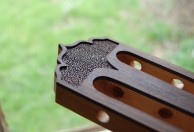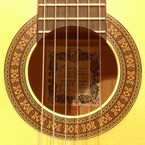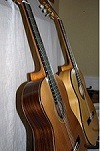Welcome to one of the most active flamenco sites on the Internet. Guests can read most posts but if you want to participate click here to register.
This site is dedicated to the memory of Paco de Lucía, Ron Mitchell, Guy Williams, Linda Elvira, Philip John Lee, Craig Eros, Ben Woods, David Serva and Tom Blackshear who went ahead of us.
We receive 12,200 visitors a month from 200 countries and 1.7 million page impressions a year. To advertise on this site please contact us.
|

|
|
Time on putting a guitar together
|
You are logged in as Guest
|
|
Users viewing this topic: none
|
|
Login  | |
|

   
Andy Culpepper
Posts: 3023
Joined: Mar. 30 2009
From: NY, USA

|
 Time on putting a guitar together Time on putting a guitar together
|
|
|
Hey all,
Just curious to compare notes on how long it takes to do different tasks, basically up to and including closing the box.
For the guitar I'm working on now I've been keeping a little log. I thought I would share some of it with you so you can poke fun at how slow I am 
This is listed by what I got done in a given day, and how many hours I spent on the guitar that day.
-Preparing neck- head flipped/glued and heel stack glued up: 4-5 hrs over a couple days
-Select, join top+back: 5 hrs
-Layout, cut to rough shape top+back, rough thickness top, put in rosette: 5
-Prepare headplate veneers and glue up headplate w/ center stripe of 6 lines: 4
-Cut out braces + braced top - 6
-Carved top, tapping, flexing, etc. - 7
-Cut out + glued on back braces, started carving, glued on head plate/veneers- 7
-Finished carving back braces, cut out tuner head - 5
-Detailed head, shaped foot, rough carved heel - 7
-Joined top+neck, made inside the box stuff, put sides on bender - 6
-Final hand-bending of sides, glued in sides - 5.5
-Glued in tentalones, side reinforcements, started trimming sides - 6
-Sanded/planed top of sides, foot, etc, glued in back linings - 6.5
-Fit back and glued it in - 6.5
________________________________________________________
Total: 80.5 hrs over 14 days
_____________________________
Andy Culpepper, luthier
http://www.andyculpepper.com
|
|
|
|
REPORT THIS POST AS INAPPROPRIATE |
Date May 2 2010 15:40:06
 |
|

   
rodpacheco
Posts: 80
Joined: Apr. 19 2010
From: Mexico

|
 RE: Time on putting a guitar together (in reply to Andy Culpepper) RE: Time on putting a guitar together (in reply to Andy Culpepper)
|
|
|
hahaha Maaan, let's just say the won't call me Speedy Gonzales anytime this week! It sounds right, I think it depends on experience, possibility to focus on the work, delivery date, the set up of your shop or workplace, etc.
I learnt with an amazing luthier in Paracho, Mexico and he builds soooo fast, so clean, exceleeeentee in every way. The only difference is that he does no finish the guitars himself, that's why he can build about 8 or 10 guitars by himself every month.
I am thinking right now, I won't worry so much about my daily schedule which is almost never met, and however long it takes to get the work done right, is the time it will take me until I get more experience and if possible a good working rhythm. At the moment is taking me 45 days to build 4 guitars from start to finish. Work Hard, Play Hard! good luck man!
Rodrigo Pacheco
|
|
|
|
REPORT THIS POST AS INAPPROPRIATE |
Date May 2 2010 17:27:47
 |
|

   
estebanana
Posts: 9353
Joined: Oct. 16 2009

|
 RE: Time on putting a guitar together (in reply to Andy Culpepper) RE: Time on putting a guitar together (in reply to Andy Culpepper)
|
|
|
When I started building and working on instruments 1979 I began by sweeping the floor in a violin bow makers shop. That lasted about two days. The bowmaker, Mr. "T", graduated me to the next higher task. Mr. T was my first teacher, his wife owned an antique shop, she was a professional "antique lady" and together they had a large shed full of pieces they had collected to be restored or repaired so they could be sold in her store.
In order to gauge whether or not I was worthy of learning to work on violins, celli and cello and violin bows, I was given the task and position of Chief Commissar in Charge of Furniture restoration. In this house there were three concurrent operations. My teacher was a former WPA artist, (for those of you out of the US that was a federal work program during the 1930s depression. ) his training and subsequent experience led him to architecture, instrument building and painting conservation. So one studio room was dedicated to fine oil painting restoration and conservation, and one larger studio comprised of three rooms served as the instrument workshop, with an outdoor annex of power tools. It was my task to find a place with a large work surface so that I could undertake the job of stripping and refinishing medium priced furniture, like desks, chairs and dressers. I was banished out of the shop and onto a plywood table in the back yard under the eaves of the porch.
I worked under the porch roof for a summer making $3.85 per hour slaving over hot caustic stripper and steel wool pads whilst poking my head into the main shop whenever possible to catch a glimpse of some violin client dropping off an instrument or bow. After the client had left I was invited in see what was going to be worked on. Little by little over the course of the first summer I was given studio room tasks which began with things like preparing the mother of pearl slide material that T used to make or replace slides in bows. Preparing the pearl or abalone was a process of selecting a section, rough cutting it and then lapping it flat on a water washed electric lapidary wheel which located in the tool annex room. Black Abalone renders the most beautiful of all pearl. The best comes from the the small coin sized section on the abalone where the adductor muscle makes it's attachment. Most of the slides and appointments on the frogs of T's best bows were made with adductor pearl from Black Abalone. T loved to tease me over and over about how I was in the back room "making pearl". This humor eluded me as I was sixteen and did not understand that "making" in depression era parlance meant ****ing. T threatened to call my grandmother and tell her I was out back "making pearl" or ****ing Pearl, whomever she was. I always presumed he meant Pearl Bailey because she was the only Pearl I had ever heard of, and this disturbed me.
I was subjected to these vile insults and hardships and my only recourse was to retaliate by dropping by the studio after work with a gorgeous girl I had been dating named "Kookie". T liked gorgeous women, but his antique lady wife forbid him to be in situations where he was "making" them. So thus began the long and antagonistic relationship I had with T, and his wife, until his death in 2000. I did not work for him for the entire duration between 1979 and 2000. By the end of the first summer I was integrated into the workshop as a full time helper/apprentice in bowmaking and cello repair. I did work for three and a half years solid in the beginning and then dropped in over the years to help out on projects or to just take up breathing space in the shop while I aggravated T in which ever way I thought at the moment would be the most aggravating.
When I first went to T's workshop it was not with the intention of getting a job making instruments, it was to get cracks in the top of my cello mended. I was in the living room waiting for him to finish a phone call, I was looking at the piano which was draped with a red and Navy blue Persian rug. It was a Beethoven era piano made by Chickering. On top of the piano, lying in state on the blues and oranges of the Persian carpet, were a half dozen very old violins. Some where Italian and some were anonymous but looked, he told me later, to be of Italian origin. One was a violin by Antoniazzi, a modern Italian maker. It was long and tubby with blackish streaks in the varnish. When T had finished his phone call he walked over and asked me what I was looking at. I motioned to the violins, I had never seen any old Italian instruments and said they were breathtaking. He began to tell me about each violin, how old it was and which city in Italy it was from. He explained that violin making in Italy was stylistically regional. Next we went out into the workshop where he showed me a few violins with the tops off, I could see inside from tail block to neck block and the corner blocks and linings. He handed an open violin to me. A moment of discovery. It was as if I had picked up a light fragile sea animals' shell off the beach. I suppose I showed enough interest and blurted out something about wanting to make a classical guitar and having had made some wooden objects in my grandfathers shop. T offered me a job as his grunt work helper, but bristled at the idea of making a guitar under his roof. He said I could learn something about all the projects in the house, if I swept the floor first.
There was a guitar maker in town, but apparently he and T had had words. Once the guitar maker and T got together to exchange information and curiosity at being two instrument makers in the same town, Redlands California. The guitar maker said he thought that making a violin bow was not that big of a deal when compared to making a classical guitar. This pissed T off and he and the guitar maker never spoke further. I never brought up the subject of guitar making again until around 1996.
The idea that making a violin bow is less an art or difficult a venture than a classical guitar is preposterous. In fact I think making bows is more difficult. The guitar maker in Redlands in the late 1970's was not a great builder, as I look back with what I know now. I am certainly glad I did not happen into his shop first and get snared into working for him as I did with T in his crazy three project circus. Some guitar makers then got away with that kind of arrogance. It was on the tail end of the classical guitar awakening in the US and several builders were riding the tide of being known because there were so few guitar makers. It was not until 1997 when I was in a bar called "The Albatross" in Berkeley California that I met a guy named Eugene Clark who was a guitar maker. He was standing at the bar watching an aire dripping flamenco guitarist named Keni Parker play his regular Thursday night sets and he was the second guitar maker I had ever met. Eventually I got to talk to him and little by little expressed a desire to build a guitar. Gene had a slightly perceptable recoil action, like a small caliber rifle, when you said "I want to build a guitar." I'm sure he had heard this from a million guys who had said they wanted to build, only to flake out. After some weeks of seeing him at the Albatross he turned to me and said "So did I hear you say you wanted to make a guitar? "
He asked how he could help me, but in a tone that seemed to ask, I don't l know if I can help you, can you help yourself? He said this with the sentiment W.C. Fields would have intoned with his cliche' line "Get away from me kid, you bother me." What hooked Mr. Gene into engaging me in conversation and ultimately letting me tag along to his work shop was when I said "I would like to see your workbench." He asked why, and I said "If I can see your workbench then I will be able to read it like a book to see which tools you use to build guitars, then I will know which questions to ask you without wasting your time." He liked that answer, he liked it very much.
T would admonish me constantly to work carefully and he had several maxims he would tout at me. Some meant to encourage and some to slow me down. One of the most interesting things he used regarding mistakes and how to fix them when you work was: "If an object can survive it's own process of manufacture then it deserves to be born a musical instrument." He was said you can fix things along the way if you make a mistake, often guitar makers and other instrument builders, whether they admit it or not, make blunders while they work. Even the most skilled seasoned craftspeople make a mistake every now and again. T's philosophy was that it gives the instrument character if you make a mistake, but are able to save it, hopefully without anyone knowing. Much of his aesthetic or threshold for finish was formed by his fondness for pre Cremonese period violins, which generally tend to be a bit more "rough" if you can call a violin rough. There is a certain brusque directness that translates the energy of the builders hand into those older violins from outside Cremona and in a more refined way it can be felt in the Cremonese violins.
It has always been a point of contention with me that current guitar making standards for fit and finish are more akin to those of freshly painted mechanically polished automobiles rolling off assembly lines than Italian violins. I believe there's vitality in the pentimenti of surface marks which guitar builders make while working. They then have to "cleanse" the guitar of it's own history to please the market.
One of T's most oft spoken maxims was "Slow down and do it right. That object is going be around for four hundred years and others are going have to look at your work. "
Time means nothing, time does not exist in instrument making. Recording clock time spent is just your ego keeping track of itself. After certain experience has been gained, a guitar or anything can be made in a small amount of clock time. There is an element to making an instrument that can't be counted in clock time and that element will last four hundred years and is the only important thing.
_____________________________
https://www.stephenfaulkguitars.com
|
|
|
|
REPORT THIS POST AS INAPPROPRIATE |
Date May 7 2010 9:40:13
 |
|

   
a_arnold
Posts: 558
Joined: Jul. 30 2006

|
 RE: Time on putting a guitar together (in reply to Andy Culpepper) RE: Time on putting a guitar together (in reply to Andy Culpepper)
|
|
|
On building speed, here is some hard data.
Salvador Castillo, IMO the best of the Paracho guitarreros, numbers, signs, and dates his instruments, and says he never produces anything but his best workmanship because he is trying to build a reputation as a world-class maker. No student models. So the prices of his different models -- classical, flamenco, etc., vary only as a function of the materials and any extras that the client wants (and of course his prices are always escalating to keep pace with the ever-increasing demand as he becomes better known).
Salvador does it for a living and so is probably as efficient as any one-man operation could be. He is well past his 300th guitar. Torres made fewer than 160 during his lifetime.
Castillo built exactly 130 guitars between Oct 2006 and May 2010 (I own both those guitars, so I can calculate). That averages out to almost exactly 3 per month. He says it takes him 40 days to finish one, so that means he is working on an average of 4 guitars at any one time.
By the way, guitar #248 was the first with the new bracing system that has gotten so much attention for cannon-like projection and increased brilliance. He plays it on his web site.
Obviously everyone works at a different pace, but I would imagine that, as demand increases, the experienced solo luthier develops techniques for increasing production -- up to a point. Jigs to speed things up, preproduction of some parts. Overlapping production so he can work on one while the glue dries on another and the finish dries on a 3rd. I could see Salvador, at some point in the future, hiring apprentices to do some of the work -- maybe cleanup, polishing, etc. I don't know what kinds of things an apprentice might do.
_____________________________
"Flamenco is so emotionally direct that a trained classical musician would require many years of highly disciplined formal study to fail to understand it."
|
|
|
|
REPORT THIS POST AS INAPPROPRIATE |
Date May 9 2010 11:22:58
 |
|

   
Flamingrae
Posts: 220
Joined: May 19 2009

|
 RE: Time on putting a guitar together (in reply to estebanana) RE: Time on putting a guitar together (in reply to estebanana)
|
|
|
Wow, there are some good and very valid points here. I'll try to cover some things that I've pick up on route.
When I learnt violin making, the time estimated to put an instrument together was 100 hours. I'm not talking finishing as this can stretch the elastic a lot.
I was fortunate to learn from a few makers who taught in Juliet Barkers Summer and Easter schools in Cambridge, UK, as well as Juliet herself. There were different methods of construction shown and ways to get round different corners. Some were more eagerly taken onboard than others but it was a good melting pot to take ways that you felt you could cope with. We payed for the courses and the information was given with love and enthusiasm for what we were doing. Apart from construction, one of the main things that I learned was how to look at wood, try to judge the responses, and to put a relatively "stress free box" together. This was invaluable. I also made a few bows under the instruction of English bowmaker Brian Tunnicliffe.
These experiences translated very well over to guitar making when I finally got into this.
I've also had some less productive experiences in my other career as a jeweller, where I had to really work hard for the people that employed me - but nevertheless, looking back, I did learn although it was not so obvious at the time and I'm still grateful for what I did. These skills again translate across the board to any amount of craft based activities.
I've also had a few students that wanted to come and do a work placement with me. My rules on this were simple. You had to stay for a minimum of 6 months (if we got on) preferably for a bit longer. As long, as people understood that it would take 2 months to get the hang of things and if I was lucky they would repay with 4 months of reasonable service. During this time, I would increase the complexity of the work entrusted so they had a few interesting pieces to do - but not before they had shown some kind of skill for the basics.
The common denominator - time - does come into play, especially if you are trying to earn a living. Bills to pay are a surefire way of making sure you meet your deadlines and encourage clients to come and pick work up. It does foster what some people might call professionalism and your speed for what ever you are doing does, not surprisingly, increase. This does not mean a reduction in quality - your just getting (hopefully) better at what you do.
I love the ideas put forward about doing small batches of things in one hit. It's one way of using time wisely. Definately necks and where you have other flat thicknessing to do.
I'm sure there are others. I'm lining up a series of necks just at the mo. I must say that I have to check myself (which I'm doing now) to do this, rather than go head long into another build.
Great story Estebanna, I really enjoyed the earlier post.
I've yet to put a figure of hours on a guitar but that will come. Keep on rocking everyone.
|
|
|
|
REPORT THIS POST AS INAPPROPRIATE |
Date Sep. 15 2010 1:00:40
 |
|
 New Messages New Messages |
 No New Messages No New Messages |
 Hot Topic w/ New Messages Hot Topic w/ New Messages |
 Hot Topic w/o New Messages Hot Topic w/o New Messages |
 Locked w/ New Messages Locked w/ New Messages |
 Locked w/o New Messages Locked w/o New Messages |
|
 Post New Thread
Post New Thread
 Reply to Message
Reply to Message
 Post New Poll
Post New Poll
 Submit Vote
Submit Vote
 Delete My Own Post
Delete My Own Post
 Delete My Own Thread
Delete My Own Thread
 Rate Posts
Rate Posts
|
|
|
Forum Software powered by ASP Playground Advanced Edition 2.0.5
Copyright © 2000 - 2003 ASPPlayground.NET |
0.125 secs.
|


 Printable Version
Printable Version













 New Messages
New Messages No New Messages
No New Messages Hot Topic w/ New Messages
Hot Topic w/ New Messages Hot Topic w/o New Messages
Hot Topic w/o New Messages Locked w/ New Messages
Locked w/ New Messages Locked w/o New Messages
Locked w/o New Messages Post New Thread
Post New Thread